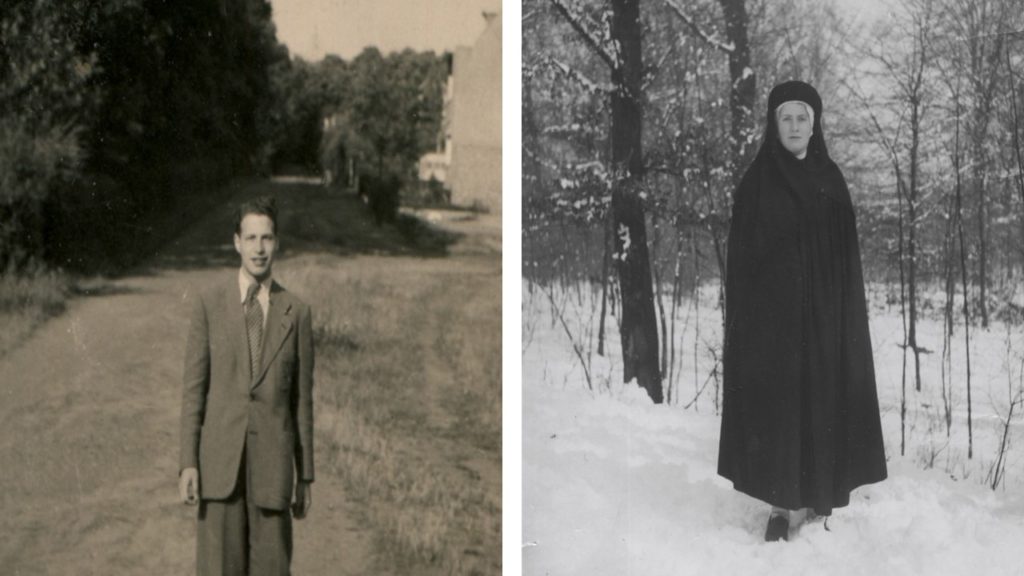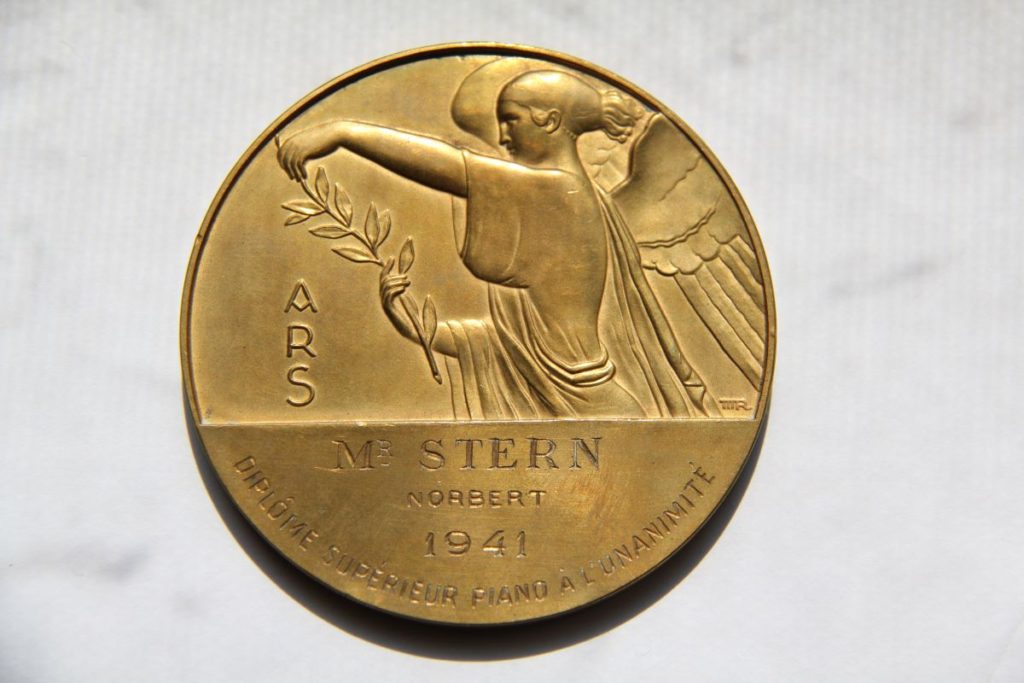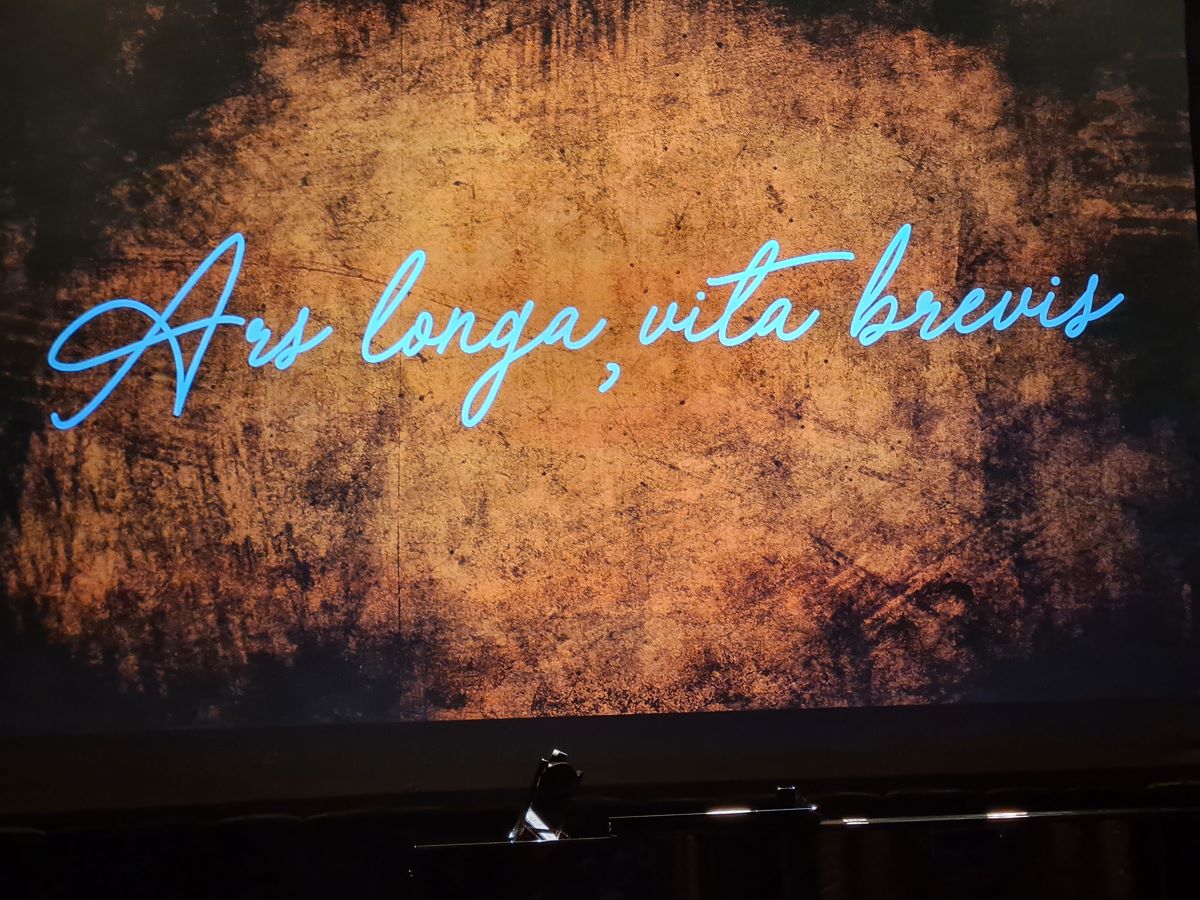The screen against the dark backdrop of the stage, at the new Marylebone Theatre, is illuminated by shades of fire-orange hues, and a scrip, stating in Latin ‘ars longa vita brevis’ meaning ‘art is long, life is brief’. The narrative is not a philosophical account of life, but snippets of events gathered by second generation Holocaust survivor – Roger Peltzmann.
Dedication is a rare type of show. American pianist Roger Peltzmann wrote, produced and performs it. ‘Drawn into the story of people he never knew, Peltzmann develops a ‘relationship’ with his uncle, Norbert Stern, a brilliant pianist murdered in Auschwitz at age 21. Learning the Holocaust trauma can be inherited, Peltzmann recounts his coming to terms with second generation survivor trauma and the role of music in helping to manage wounds that will never fully heal.’

Peltzmann says ‘as survivors dwindle, the next generation must pick up the gauntlet. With Dedication, I’m trying to share with the audiences the history and lessons of the Holocaust… and the legacy of trauma. By focusing on my family…the vastness of the Holocaust, and its legacy, becomes personal’.
Peltzmann dedicates the show to the memory of his uncle, Norbert Stern, an extraordinary prize-winning pianist and possibly the finest young pianist of his generation.
Peltzmann is a mesmerising storyteller. He uses family photos, quotations, news cuttings, maps, sound effects, music, piano and himself, as the storyteller. The trauma will ring true for second generation children, especially those whose parents refused to discuss it, but have very few relatives as a consequence. This is something that gets worse over time; this show may help in dealing with it.

Peltzmann’s family escaped from Berlin to Brussels with fake ID. From Brussels, his mother, Beatrice, was the only one who escaped the Gestapo, fleeing along the rooftops of Brussels, hiding with friends, sent to a nunnery where she passed for a nun, (we see the photo) and finally reaching USA. Her parents and brother, Norbert the pianist, were sent to Auschwitz; The parents were murdered on day one, Norbert on day three of forced labour. His mother, unlike most survivors, did talk about what happened. “My mother’s tragedy was losing her family at 17, mine was knowing yet not knowing them…the presence of absence. He lived with their ghosts, especially that of Norbert. Peltzmann started playing jazz, but got drawn into the classical world, especially Chopin, Norbert’s favourite composer. Not every pianist can really play Chopin, but Norbert, even at a young age, could, and once Peltzmann was captivated by classical piano, Norbert captivated him as well. Peltzmann therefore began a journey to discover the events leading to the death of his family. He found the friend who had hidden Beatrice in Brussels, the Steinway Norbert had played, and, as the Germans kept precise records, details of their processing and death in Auschwitz.
Some of the quotations are particularly insightful. ‘It is a haunting reminder that while artists come and go, some with lives brutally cut short, their art endures’.

As Norbert never left a recording, Peltzmann went to Brussels to play in the hall and on the piano Norbert had played years earlier, to record a Chopin CD in his memory. He felt a strong spiritual connection with Norbert there, and even felt at times that it was Norbert playing and not himself.
The show lasts about an hour; my only regret is that, although we did hear Peltzmann play the piano, from blues to Chopin, that I would have liked to have heard more, especially something from the Chopin CD on sale in the foyer. Had the show lasted another 10 minutes, nobody would have minded and might assist CD sales.
This is a powerful and moving show, but the subject matter about Nazi murders and how it affected families is not for everyone. For a second-generation survivor it can be distressing, but healing. For those interested, see it whilst you can; it is excellent.
The Marylebone Theatre, formerly the Steiner Hall, is a new, versatile performance space. It is very accessible just outside the congestion zone with free parking after 6.30.

